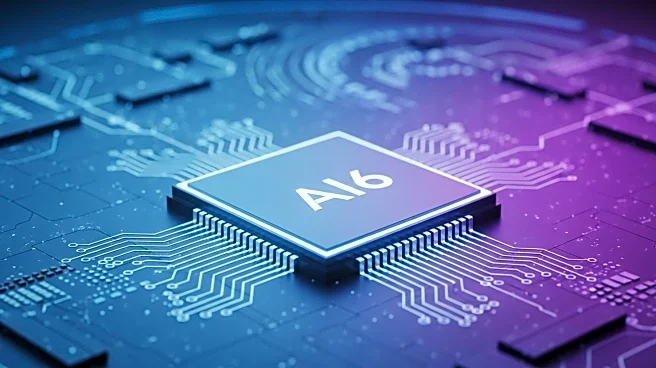What's Happening?
Tesla, led by CEO Elon Musk, has announced a strategic shift in its AI hardware development, moving away from the Dojo AI supercomputer project to focus on the AI5 and AI6 chips. The AI6 chip is touted as the 'best AI chip to date,' while AI5 is described as an 'epic-level chip' aimed at enhancing Tesla's Full Self-Driving (FSD) and robotics capabilities. This decision follows the discontinuation of the Dojo project, which Musk labeled an 'evolutionary dead end' after six years of development. The Dojo supercomputer was initially designed to process large volumes of video data from Tesla's global vehicle fleet for AI training. However, the project faced several challenges, including technical and financial issues, as well as key personnel departures. The AI6 chip, developed in collaboration with Samsung, is intended to streamline Tesla's AI operations across autonomous vehicles, robotics, and data center applications.
Why It's Important?
The shift from Dojo to AI6 chips marks a significant change in Tesla's approach to AI development, reflecting broader industry trends towards scalable, off-the-shelf solutions combined with custom silicon. This move could enhance Tesla's flexibility and capacity for AI training and model development, particularly for its autonomous driving and robotics initiatives. The decision to invest $500 million into a new supercomputer in Buffalo, New York, leveraging AI6 and GPU-based compute power, underscores Tesla's commitment to advancing its AI capabilities. This pivot could potentially improve the performance and scalability of Tesla's AI models, enabling faster iterations and broader deployment of autonomous features. The strategic shift also highlights the challenges of developing proprietary AI hardware and the benefits of hybrid approaches that integrate partnerships with leading chip manufacturers.
What's Next?
Tesla's focus on AI5 and AI6 chips is expected to drive its future AI innovations, particularly in autonomous driving and robotics. Musk has previously stated that Optimus robots will account for a significant portion of Tesla's future valuation, emphasizing the strategic importance of these technologies. The integration of AI6 into Tesla's infrastructure could enhance the performance of its AI models, facilitating faster iterations and broader deployment of autonomous features. As Tesla continues to refine its AI roadmap, the lessons from the Dojo project will remain integral, providing insights into the challenges of proprietary AI hardware and the benefits of hybrid approaches.
Beyond the Headlines
The discontinuation of the Dojo project and the shift to AI6 chips reflect a pragmatic approach to balancing innovation with practicality. This decision may also influence Tesla's relationships with chip manufacturers like Nvidia, AMD, and Samsung, as the company moves towards a more flexible model that integrates commercial solutions. The strategic pivot could also impact Tesla's position in the competitive landscape of AI-driven innovation, as it seeks to maintain its leadership while addressing the logistical and economic realities of modern semiconductor development.









